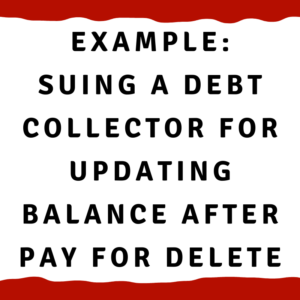Example: Suing a debt collector for updating balance after pay for delete
Example: Suing a debt collector for updating balance after pay for delete
Today, I wanted to share with you an example of a case we filed in the context of a pay for delete.
This is just one of the many cases we file against debt collectors for violating the Fair Debt Collection Practices Act (FDCPA) and the Fair Credit Reporting Act (FCRA).
What is a pay for delete?
A pay for delete is when you call up a debt collector and get a settlement offer to pay less than the amount they say you owe.
Before you agree, you ask them to delete the debt from your credit report.
We typically recommend you get this agreement in writing or record the call if legal in your state.
We have more detailed information available on this if you are interested in learning more.
This pay for delete is a clear agreement. There is no doubt what was said.
What if you owed $500, settled for $300, and then instead of deleting the debt from your report, they show a $200 balance?
In this particular case, we paid the money and the debt collector reported the payment to the credit bureaus.
So the report said that we owed $500, we paid $300, and now we still owe them $200.
Do we actually owe them $200?
No.
The settlement agreement was that you pay $300 and you are done.
So we held up our end. We paid $300.
If they do not update the report and then after 30 days, they delete it.
This is fine unless there was a shorter time limit promised in the agreement.
Generally, these companies will ask for thirty days or so to delete the account.
But if they update the report before they delete it, what should the balance be?
Zero.
Not $200.
So we sue them for this.
As you can imagine, they are not very happy about this.
But they should have deleted it. It is what they promised to do.
If they can update your credit report within 30 days to show an incorrect balance, they should also be able to delete it within 30 days.
They should not have updated the report to show a $200 balance.
So what does this violate?
This violates a number of laws, including FDCPA section 1692e.
1692e deals with misrepresentation, lying, and deceit.
It also provides a number of examples.
The specific example being violated here is 1692e(8) which deals with false credit reporting.
This part of the law tells debt collectors not to falsely report, or report something that they should know is false.
When they update your report to the bureaus (Equifax, Experian, TransUnion) saying you owe $200, did they know this was untrue?
Absolutely, they knew it was untrue.
This also violates other several sections of the FDCPA.
1692f deals with unfair conduct.
This section says you cannot try to collect any amount that the agreement does not allow you to collect.
If you have paid the agreed amount, does the agreement allow them to collect anything?
No. If nothing is owed, no contract would allow you to collect.
1692d deals with harassment.
Are they harassing you over this debt you do not owe? If so, they are also violating this part of the FDCPA.
These are just a few of the variety of things we could sue them for at this point.
Understand that if you do a pay for delete and they do not delete it, you can sue them for this.
If you do a pay for delete and they update your report to show a different balance rather than deleting it entirely, you can sue them for this.
Sometimes their argument is that they were waiting for your check/payment to clear.
But if they were waiting for the payment to clear, they would not have reduced the balance from $500 to $200.
If they changed the balance from $500 to $200, they knew the $300 payment was good.
They have just updated your report with false, untrue information.
Maybe you want to just let it go. That’s your choice.
Or you can sue for this.
Personally, I believe these abusive debt collectors should be held accountable for their actions.
You could sue them under the FDCPA and perhaps other state laws.
If you are in a similar situation or you are uncertain about some of the information on your report after dealing with a debt collector, look into what laws are in place to help you.
Find a consumer lawyer in your state who is familiar with these types of cases.
If you live in Alabama and you have any questions, feel free to get in touch with us.
We would be glad to help you in any way we can.
You can reach us by phone at 1-205-879-2447, or you can fill out a contact form and we will get in touch with you quickly.
Thanks for reading, and have a great day!
